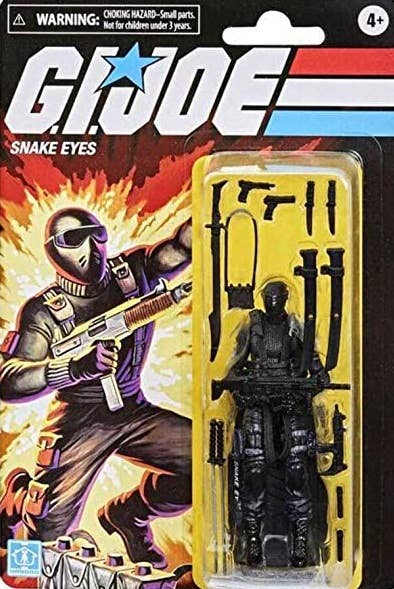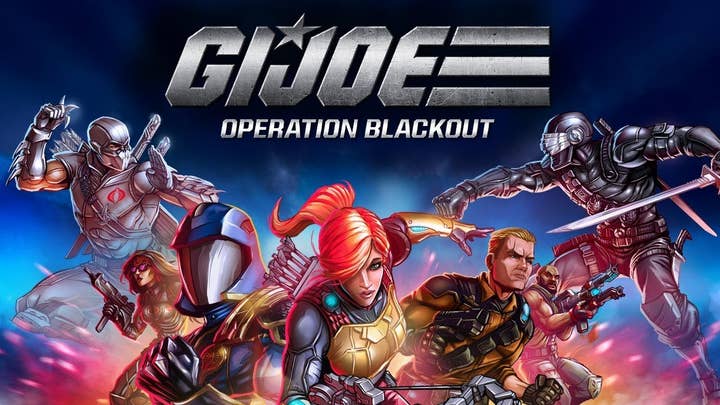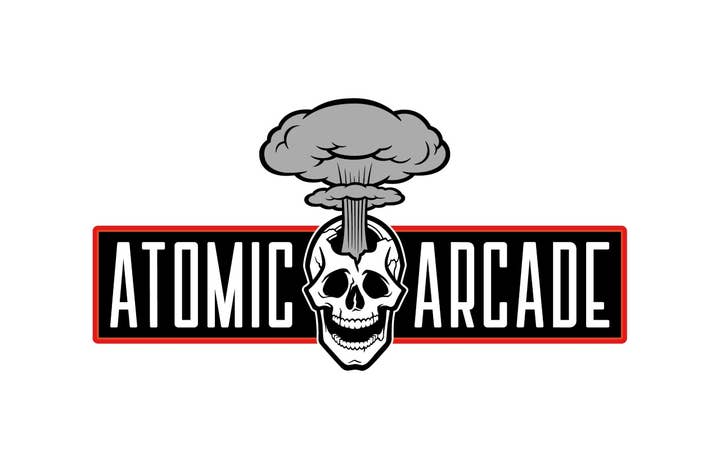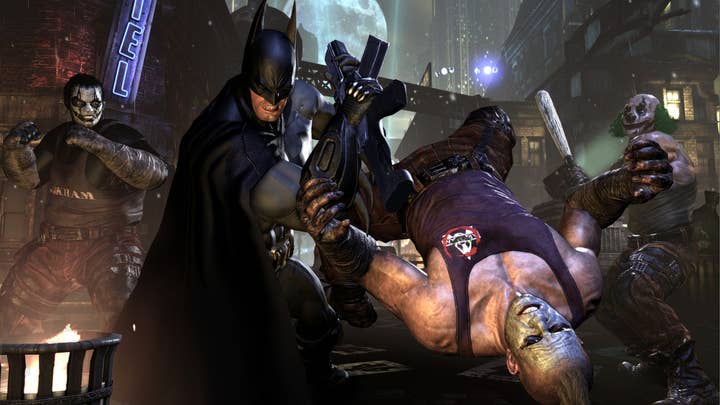Snake Eyes and the evolution of adaptation
Atomic Arcade GM Ames Kirshen explains why Wizards of the Coast's new Raleigh studio is trying a "more edgy, contemporary, mature" game based on the G.I. Joe character
Ames Kirshen has been keenly interested in licensed gaming adaptations for about as long as licensed gaming adaptations have existed.
"Once that Superman [Atari 2600] game came out shortly after the 1978 Christopher Reeves movie, I was immediately enamored with the idea I could actually play one of my favorite characters," Kirshen tells GamesIndustry.biz. "Even though he was probably like five pixels at the time, it still was the most amazing thing I'd ever seen.

"I was always enamored with the idea of the video game medium being the only major entertainment medium where you aren't passively watching a story play out with these characters. This is the one where you are actually taking control of these characters, assuming that role, and shaping that story with you being that character."
Kirshen was so enamored with the idea that he grew up to build a career around it. For most of the past 20 years, Kirshen has been dealing with comic book video game adaptations, representing both comic book companies like Marvel and DC, as well as the teams that make the games at Warner Bros. Interactive Entertainment.
Along the way, he's worked on some of the best-received examples of licensed games, executive producing games like Spider-Man 2 and Incredible Hulk: Ultimate Destruction from the Marvel side, then executive producing games like Batman: Arkham City and Injustice: Gods Among Us from the WB Games side.
"I always had this great desire to tackle G.I. Joe and take a crack at making an amazing game with the IP because I think there's a lot of potential there"
Kirshen left DC to join Wizards of the Coast early last year, around the time its parent company Hasbro was contemplating having taking the Magic: The Gathering and Dungeons & Dragons brand's game development operations and applying them to its own stable of toy properties.
"I always had this great desire to tackle G.I. Joe and take a crack at making an amazing game with the IP because I think there's a lot of potential there," Kirshen says. "So long story short, we decided to build a studio to support that franchise, to support that game."
That studio is the Raleigh, North Carolina-based Atomic Arcade. The game is Snake Eyes, a AAA action-adventure title that Kirshen describes as "a much more edgy, contemporary, mature take on G.I. Joe to really suit what we felt we needed to have this IP and game resonate with a modern consumer."
Kirshen says the Hasbro team was very receptive, but still needed some reassurance that this would be a good direction for the brand. After all, this would be the first time Wizards of the Coast developers would be handling a Hasbro IP, and the proposed idea was skewing considerably older than recent game adaptations for G.I. Joe.

"It was a process of getting them comfortable with the direction we wanted to go with, that this is the type of content the market is looking for," Kirshen says, "that people grew up with this IP and those who grew up with this IP back in the days of Real American Hero at its peak in the '80s and '90s are now fathers and uncles, and these are the mass consumers of these AAA consoles and PC platforms. And they want content that grows with them."
It's a process a lot of licensors have gone through in the past dozen years or so. Kirshen says when he broke into the industry, it was still common for gaming adaptations to use what he calls "the day-and-date see-the-movie, play-the-game model."
"Time was the biggest enemy of [movie-based] games... Also, you were working within someone else's box and vision of what they wanted to do with the IP"
By releasing direct adaptations alongside their theatrical counterparts, game makers could ride the wave of buzz and movie marketing. While it made for plenty of best-sellers, Kirshen said that approach took its toll on quality.
"You need the right amount of time -- gestation time, breathing time -- for iteration required for high quality game," he says. "Time was the biggest enemy of those type of games in that particular era. Also, you were working within someone else's box and vision of what they wanted to do with the IP.
"If you look at what the evolution has been in the late PS3 era moving into PS4, it's been to take these ideas and craft unique experiences taking some of the best elements of the underlying IP from the source material, but creating a version specifically for the video game market and video game consumer. As opposed to taking someone else's version of the characters and trying to adapt that to the medium when that wasn't organically created for that medium from the get-go."
He points to 2009's Batman: Arkham Asylum as a key success for that approach to adaptations.
"At the height of the Christopher Nolan trilogy, rather than doing a game based on that Batman, working with Rocksteady we crafted our own version of Batman that was specifically built from the ground-up to be an amazing, cutting-edge, high-quality Batman game that was very much inspired by other media and the core canon of Batman, but was its own unique, fresh take made for gamers from the ground up," he says. "Based on the huge success of that, that became the model for us across all of our portfolio at DC."
That model has been picked up by plenty of other gaming adaptations, something Kirshen chalks up to a number of factors, among them the fact that more of these games are now being made by developers who grew up with the licenses in question playing a formative part of their childhood.
"As developers grew up with these IPs they loved, they just wanted to see them translated into high quality experiences," Kirshen says. "And that took a bit of time for those developers to grow up to become game developers, honing their skills and talking to various companies and license-holders about taking those games and making good games out of them."
"There are things every creator needs to do for the medium they're creating that sometimes will need to push the boundaries of some of the rules and guidelines of the IP"
It has also required more trust from the license-holders to build a new vision of their properties specific to video games.
"There are things every creator needs to do for the medium they're creating that sometimes will need to push the boundaries of some of the rules and guidelines of the IP, as long as you're still being very respectful to the underlying IP and respecting the essence of it -- on a micro character level as well as a macro world-building level," he says.
Of course, it's not just a new take on Snake Eyes that Kirshen is building. He's making a new development studio from scratch in an industry that has seen more than its share of cautionary tales about toxic studio cultures of late. Kirshen says establishing a healthy culture for Atomic Arcade is one of the foremost issues on his mind.

"We want to make a studio that is inviting, collaborative and transparent, with as much representation across different cultures, ethnicities, and genders as we can," he says. "Because that's the representation of the world today, and we want to make a game that appeals to a mass market. We want to get different perspectives, different points of view, and different sets of experiences into the studio. And we want a very collaborative, family-like environment we're creating."
He adds, "I feel like games have gotten so high-profile and there's so much stress and revenue at stake that sometimes we lose sight that we're making video games, which is a real privilege and an amazing thing to get up every morning and do."
While some studios have paired that privilege can with unreasonable demands of employees in the past, Kirshen says he doesn't wants Atomic Arcade to accept crunch as the norm.
"Every game development has deadlines, key milestones that are really important to the health of the project and to keep the project on track and keep to the schedule and budget," he says. "But I think there's a way in the world today -- with enough planning, with a distributed workforce -- the word 'crunch' should not have to be part of the equation. It shouldn't be an expected thing and it's something we don't want to be in the vernacular of our studio."
He says he wants to have enough padding in the schedule to help avoid crunch, and believes the studio's hybrid in-person/remote working setup could help as well. And Atomic Arcade isn't limiting that hybrid model to just people in the Raleigh area working from home a few days a week.
"There's amazing global talent in the game development sphere we can't ignore, and in a post-COVID world, I think remote-working has proven that it's something people can be very effective in," Kirshen says. "So we want to not close the door on anybody interested in working with us, on our game, and at our studio, no matter where in the world they are."

